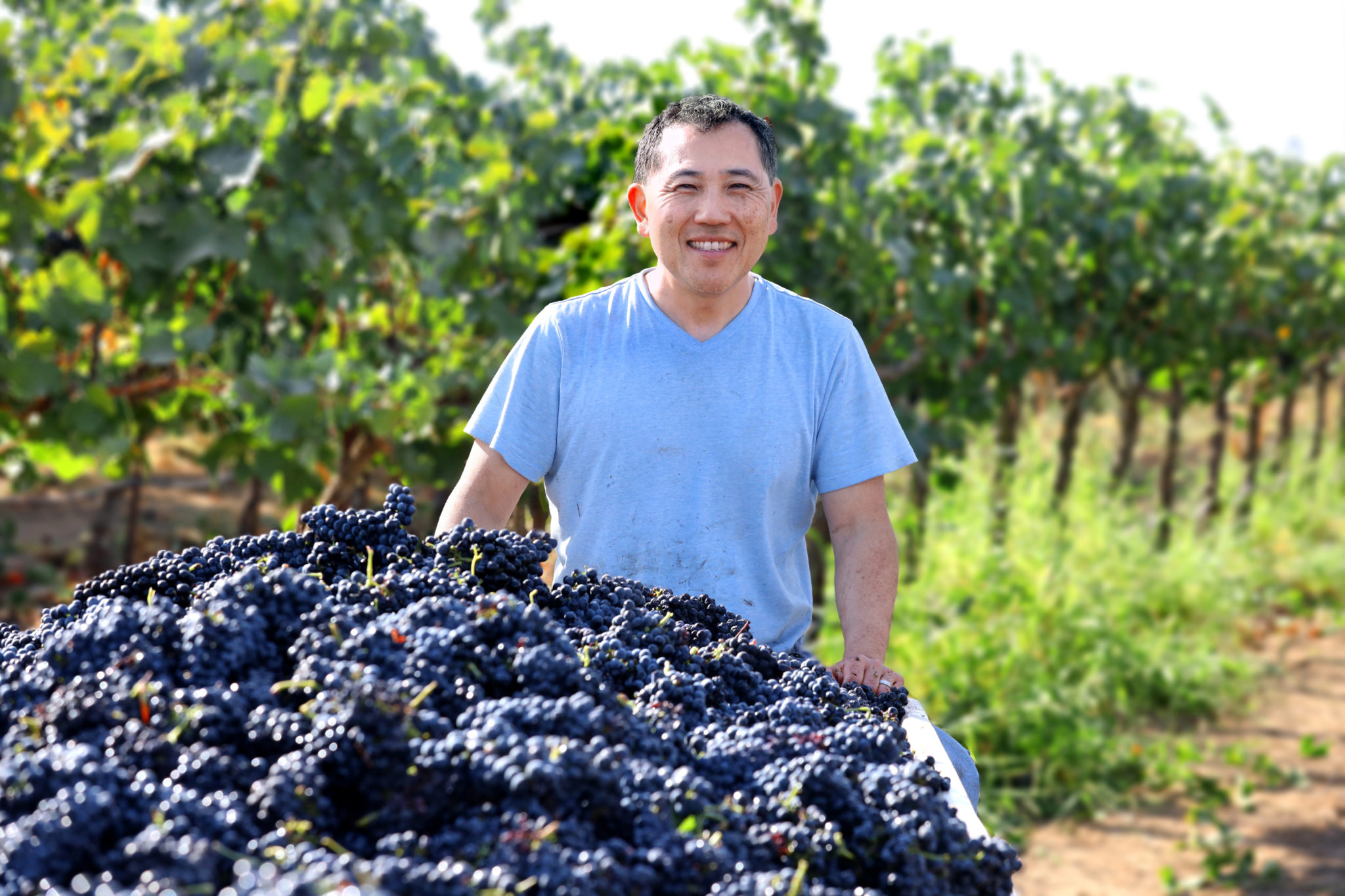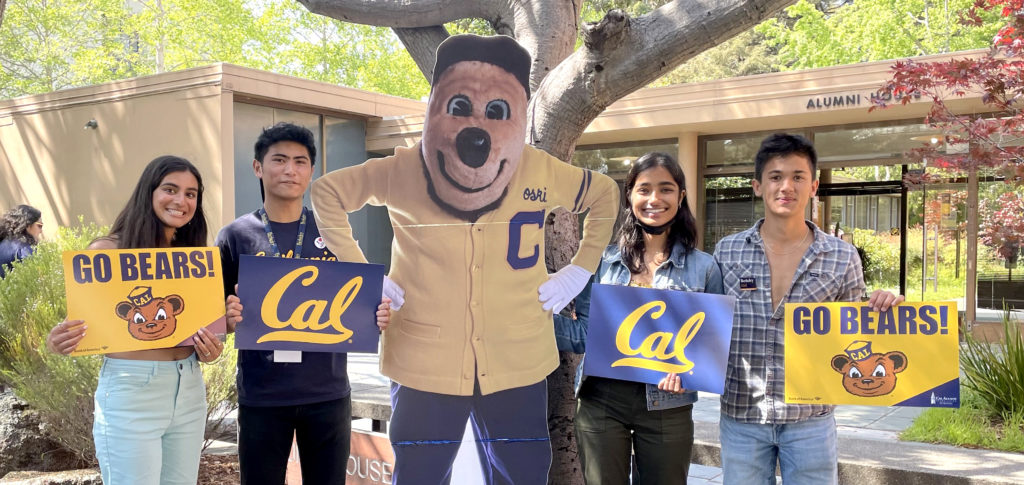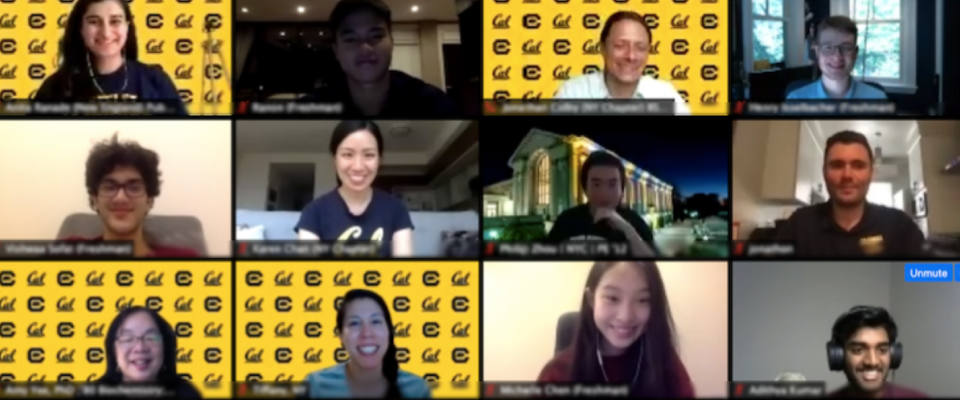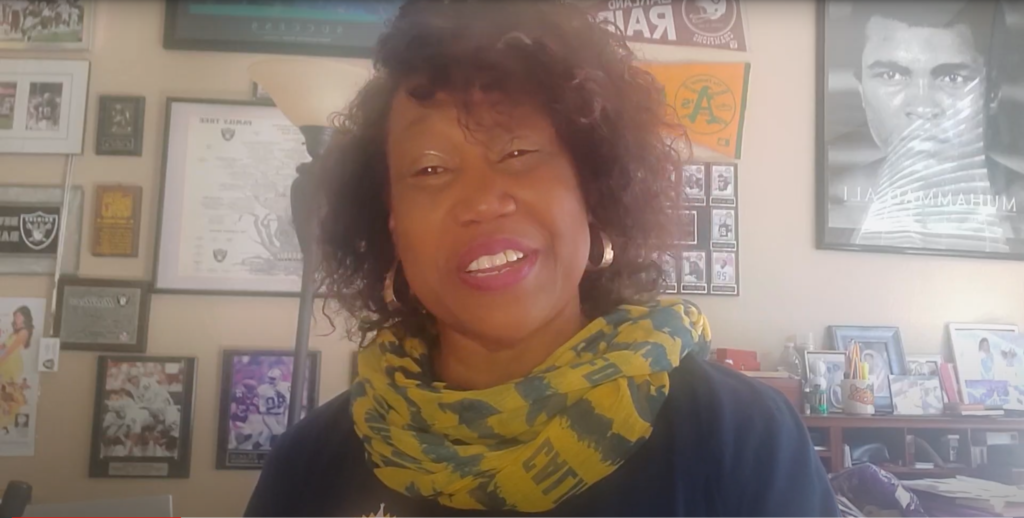In 1896, Jason Mikami’s grandfather began farming in Lodi, where he developed a passion for grape-growing. Now in its second century and third generation of farming, Mikami Vineyards produces single-vineyard handcrafted wines from premier blocks of the family estate. In 2005, when Jason’s father passed away and he took over the family business, the Mikami family decided to dedicate a portion of the vineyard to producing wine under the family label. In 2008, they had their first vintage. When Mikami isn’t managing the vineyard and honoring the family business, he is the director of engineering at Uber in San Francisco.
The Cal Alumni Association spoke with Mikami for our Bears in Business series, where Cal alumni connect their time at Berkeley with their professional ventures.
Cal Alumni Association (CAA): Can you touch on your family’s history with grape-growing? What is it like producing wine under your family label?
JM: I was born and raised in Lodi, California, on the family vineyard that sources the grapes for our wines. In 1896, my grandfather journeyed to America, settling in Lodi. He began farming grapes, and later my father continued the tradition. In total, we have been growing grapes for over 125 years now. In 2005, my father passed, and it was my turn to manage the family vineyard. We dedicated a block of the vineyard to produce wines under our family label and released our first vintage in 2008.
One thing that comes to mind, and it ties into my Japanese American heritage, is if you look at the landscape of wine-making, in particular grape-growing, if you go back to my father’s generation, there were a lot of Asians, Asian Americans, Japanese Americans in Lodi raising grapes. Today there are virtually none. Kids like me all went to Cal and did other things, so to see a Japanese American name on a label is really special to me.
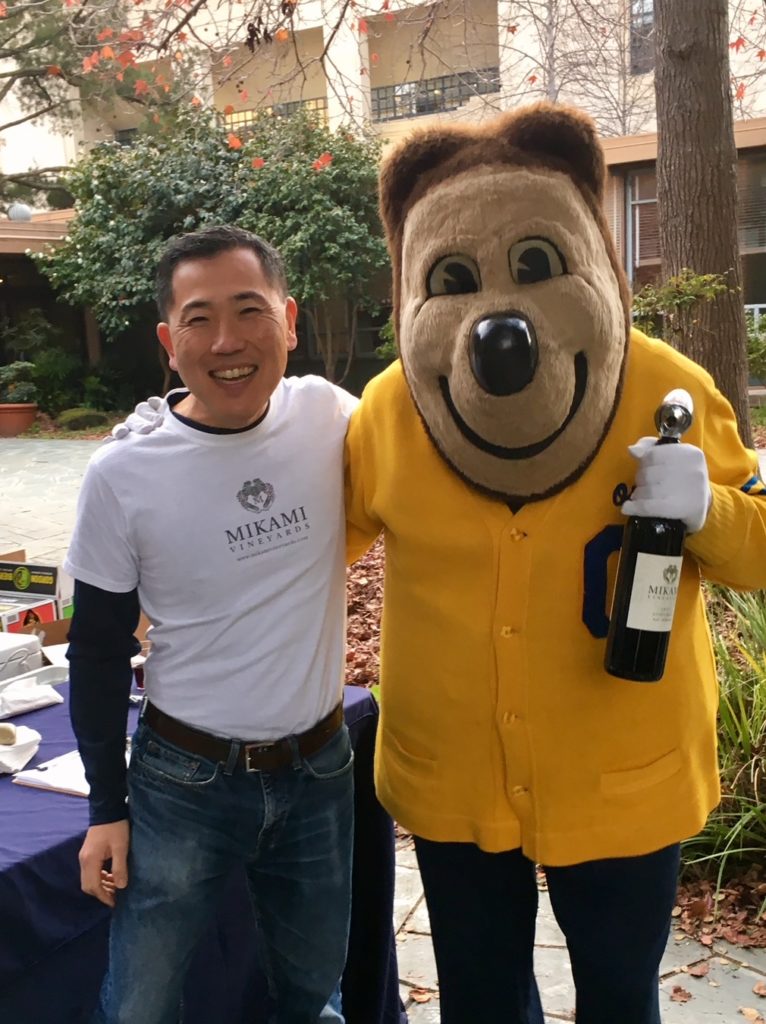
CAA: Any favorite memories at Cal? How did you choose Cal?
JM: My special memories are tied to my roommates and I going to Cal football games, both home and away, and seeing great wins like beating UCLA at the Rose Bowl and also tough losses like the one to Washington at home when both teams were undefeated and ranked in the top 10. I also wonder how many folks remember how excited Chancellor Tien would be at football games! He would be right under the goalpost raising his hands up when we would make an extra point!
CAA: Did your experiences at Cal shape your postgrad goals?
JM: Absolutely. It opened my eyes to the diversity of people, thoughts, and experiences. This has driven me to seek out opportunities that help expand my goals and challenge my status quo.
CAA: What advice would you give current Cal students?
JM: At my age now, and having been in the industry for a long time, time is short. You don’t have much of it. Especially at Berkeley, you have so many opportunities to meet so many different people and do things like EAP (Education Abroad Program), which I was lucky to do as well—study abroad—just do it! Come back and you might have an extra semester, and yes money is involved but you will make it up after you graduate, especially with a Cal degree. Take your time. Have fun. Experience this fleeting time of your life. Find what you love. Take advantage of everything you can is my key advice.
One has to work hard, be scrappy, and have the grit and resolution to succeed at Cal. It is the greatest training ground for having to deal with real-world problems and enables better business decisions.
Jason Mikami ’92, MBA
CAA: How does your Cal education and experience influence your business decisions today?
JM: More than anything, a Cal education allows me to take a broader perspective and to use the knowledge and experience I gained at Berkeley and apply that to any problem I may encounter. As many of us know, one has to work hard, be scrappy, and have the grit and resolution to succeed at Cal. It is the greatest training ground for having to deal with real-world problems and enables better business decisions.
CAA: Who influenced you the most as a mentor, either at or outside of Cal?
JM: Charlie McCullough, a former executive of a tech startup I worked at, taught me how to lead, prioritize, and relate to people. He did this via personal stories that related to the situation at hand, which is a technique I use to this day both in business as well as in raising my daughter.
CAA: What does a typical day look like for you?
JM: My career coming out of Cal has been in tech. I started off doing work in the semiconductor industry and at that point it tied more to my Japanese degree that I originally got from Cal. Shortly thereafter I realized that I needed a technical degree to advance my career, so I went back and got an electrical engineering and computer science (EECS) degree from Cal. Coming out of that, I have been part of a number of different startups, since the dot-com days until now. Now I’ve been with Uber for almost five years as Director of Engineering.
My day-to-day is thinking about how to make sure Uber has enough computing capacity for sustaining its global ride-sharing and food delivery service, but after that it’s about the winery. So, I wear both hats, leveraging my EECS degree from Cal during the day and doing all the wine business on the side.
CAA: What was it like to start your own winery?
JM: The winery is really a way for me to honor my father and grandfather, both of whom toiled in the vineyards as farmers facing many challenges over the near-century that they were in California. Internment during WWII is just one example. For me, the winery has special meaning.
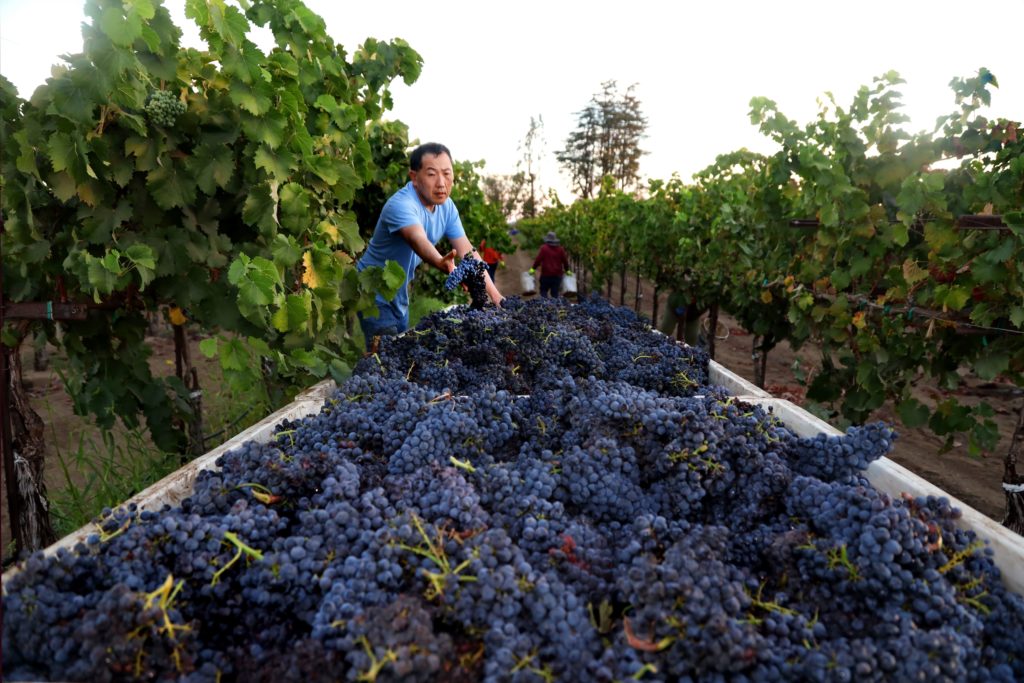
CAA: What’s your favorite place in your winery?
JM: The vineyard. One of the key metrics for making great wine is the number of footsteps you’ve taken in the vineyard. This is the best way to have a pulse on how the fruit and vines are doing.
One of my favorite times in the vineyard is in spring when we conduct shoot thinning. It’s a beautiful time of the year, and the work is soothing—being amongst the new growth of the vines in cool, 70-degree weather. It’s therapeutic.
CAA: What are some parts of wine-making that most people don’t know about?
JM: I think one thing people don’t think about is that, in order to make high quality wine, you have to manage the vines a lot through the growing process. That includes dropping a lot of fruit, so in the beginning of spring you’re going to drop a bunch of clusters, and in the beginning of summer you are going to look at what’s remaining and see if you need to trim some of those clusters or drop even more fruit. Then as you get closer to harvest, you’re seeing an imbalance of some clusters ripening a little bit faster than the others and you want a more balanced ripening across all of your fruit, so you’re dropping more fruit again.
In the beginning stages of the vine’s life, like in the early years, there is so much fruit growing on it because the vine is vigorous. You’re probably dropping over half of the actual fruit the vine is trying to produce and you’re only keeping a small fraction of that to make sure you’re only getting the very best quality fruit. A lot of people don’t know that and think you’re growing grapes, crushing them, and making wine, but there is a lot that goes into the viticulture side.
CAA: What’s your go-to wine?
JM: Anything from Mikami Vineyards! Outside of this, I’ve recently enjoyed drinking Assyrtiko, a white wine varietal found on the Greek islands. In Santorini, the vines are grown in the shape of a basket, low to the ground. The wines are crisp with bright acidity and extremely food-friendly.
CAA: What have been the three most valuable lessons you’ve learned as a business owner?
JM: Customer service matters. How you treat your customers will determine long-term loyalty.
Details matter. Your customer will always appreciate the small details you put into your product. As an example, we hand-number every single bottle of our flagship zinfandel.
Being able to do ROI (Return on Investment) calculations quickly is critical. When you are overwhelmed with so many tasks, you have to decide quickly and decisively which things are the most important to do right now.
CAA: Which classic Cal campus eatery pairs best with your wine?
JM: Zachary’s stuffed pizza! The rich, ripe tomatoes go really well with our zinfandel and petite sirah.
Transcribed by Noa Berzon
Learn more about Jason Mikami and shop Mikami Vineyard wines and products on their website, mikamivineyards.com.
Enjoy tasting fine wines and supporting the Cal Alumni Association? Join us in celebrating incredible alumni-made wines by signing up for The Graduate Wine Collective, UC Berkeley’s alumni wine club. Members receive three shipments of wine each year and exclusive invitations to wine-tasting events.






